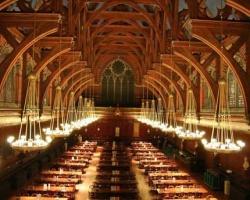When Harvard was founded nearly four centuries ago, all students read and spoke Latin. They had t Lectures were delivered primarily in the ancient tongue, and the classics was pretty much all they could study.
Today, the number of students conversant in Cicero and Plato has dwindled, with only 42 – less than 1 percent of Harvard’s 6,640 undergraduates – choosing classics as a major. Then there’s Sanskrit and Indian studies, which has three students, and astronomy and astrophysics, with five starry-eyed souls.
Although most students may deem the undersubscribed subjects impractical, the bastion of liberal arts education has in recent years begun promoting learning for learning’s sake as a worthy and enriching pursuit. Rather than viewing a major solely as a stepping-stone to a career, the university is pushing students to broaden their interests and explore more esoteric topics.
Professors and students in those subjects insist that studying even the most obscure disciplines can lead to jobs in a variety of fields, from academia to finance.
“It’s amusing when you tell people you’re in a concentration and they say, ‘I didn’t even know we had that here,'” said Daniel Handlin, an astronomy and astrophysics major who wants to be an astronaut. “People can imagine the classics existing, but a lot of people just don’t even think of astronomy at all.”
To entice students to explore such subjects, Harvard has more than tripled the number of small freshman seminars taught by star professors. Among the 132 diverse classes: “The Beasts of Antiquity and their Natural History.”
Harvard has also delayed the deadline for declaring a major from the end of freshman year to the middle of sophomore year, to give students more time to sample different disciplines. And the university has begun allowing students to declare a minor, encouraging them to venture in some depth beyond their main academic interest. A minor requires four to six courses in a department.




